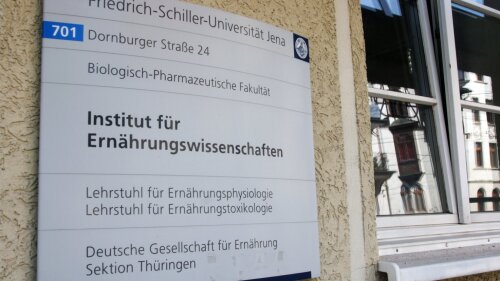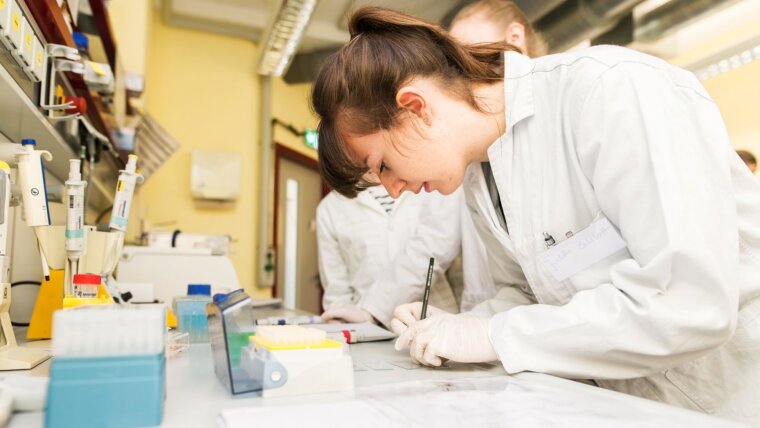Welcome to the Institute!
deThe Institute of Nutritional Sciences is housed within a strong, interdisciplinary faculty on Dornburger Straße in Jena.


Insect burgers… black ice cream… chocolate pudding fruit… Welcome to the age of crazy food trends! German food culture is becoming more colourful and diverse – and is also affected by social change. The origin of food is also becoming increasingly important to people when shopping. And hardly a day goes by where we don’t see tempting food pictures on social media. But what is actually in the food we eat? And what effects does it have on the human body? Where do we draw the line between healthy eating habits, overeating and undereating? Is a vegetarian diet better for you? These are just some of the questions covered by our bachelor’s degree in ‘Nutritional Sciences’ (Trophology).
During your studies, you will learn exactly how the interaction between nutrition and the human body works. You will deal with the composition of food right down to the individual ingredients and nutrients, which affect the metabolism of cells and entire organisms and influence our health and well-being. And things get even more complicated when an illness is thrown into the mix.
In addition to knowledge of foodstuffs and the effects of certain nutrients, our personal eating habits also play an important role. Although many people know that they are not eating healthily, for example, they still find it difficult to change their eating habits. The basic aspects of these psychological processes will also be taught and discussed in your degree programme.
You will need scientific and biomedical knowledge to understand some of the more complex concepts. This is the only way you will be able to learn all the important and sophisticated aspects of nutrition across various disciplines.
Student in seminar
Image: Christoph Worsch (University of Jena)A bachelor’s degree is the first professional qualification that can be obtained at a university. The standard length of the programme is six semesters, and different types of courses are offered for each module (e.g. seminars, lectures or practical classes).
If you opt for a single-subject bachelor’s programme in ‘Nutritional Sciences’, your education will be focused on one subject comprising 180 ECTS credits (1 ECTS credit = 30 hours of attendance, preparation and follow-up work, private study, assessed coursework and examinations).
In the first and second semesters, you will be given a strong scientific and biomedical grounding in the subjects of microbiology, botany, zoology, physics, mathematics, chemistry, biochemistry, and molecular and human biology. You will then build on this foundation in the third and fourth semesters with content related more specifically to nutritional sciences, such as nutritional physiology and toxicology, biochemistry of nutrition, and food science. You will then apply the knowledge you have acquired up to that point in practical training related to nutritional sciences throughout the fourth semester.
Based on these experiences, you will be able to focus on topics of your choice in the fifth and sixth semesters with a wide range of advanced modules.
| 1st semester | 2nd semester | 3rd semester | 4th semester | 5th semester | 6th semester |
| Basics of human nutrition (10 ECTS) |
Physiology of nutrients (10 ECTS) |
Practical Training (30 ECTS) |
Choice between six advanced modules (30 ECTS in total)*
|
Choice between four advanced modules (20 ECTS in total)* |
|
| Zoology (5 ECTS) |
Biochemistry (10 ECTS) |
||||
| Microbiology (3 ECTS) |
Food Science (10 ECTS) |
||||
| Botany (7 ECTS) |
Biochemistry of Nutrition (5 ECTS) |
||||
|
Cell and Molecular Biology (5 ECTS) |
Nutritional Toxicology (5 ECTS) |
||||
| Chemistry (11 ECTS) |
Bachelor’s dissertation (10 ECTS) |
||||
| Physics & Mathematics (9 ECTS) |
|||||
Abbreviations: ECTS = European Credit Transfer System
* Advanced modules may be selected from three specializations that prepare students for master's degree programs or other advanced professional training: The directions include molecular nutrition science (research), applied nutrition science, and business administration.
You can find more detailed information in the module catalogue for the degree programmeExternal link.
Career opportunities:
Student in the laboratory
Image: Christoph Worsch (University of Jena)A university entrance qualification, such as a general secondary school leaving certificate, is required for admission onto the study programme.
More information on university entrance qualifications can be found here.
The study programme is taught in German. You must therefore have a very good command of German at the start of the study programme.
Bachstr. 18 k
07743 Jena
Google Maps site planExternal link
Dornburgerstr. 25-29
07743 Jena
Google Maps site planExternal link
Telephone hours:
Fridays (9:00 – 11:00)
Bachstr. 18 k
07743 Jena
Google Maps site planExternal link
Dornburger Str. 29
07743 Jena
Google Maps site planExternal link
University Main Building / SSZ
Fürstengraben 1
07743 Jena
Google Maps site planExternal link
Office hours:
We offer consultations in person, by telephone, and via Zoom. You can make an appointment by calling us on +49 3641 9-411111 (Mondays to Fridays from 9:00 to 11:00) or outside these office hours on +49 3641 9-411200. You can also use our remote help desk.
Consultation hours:
Mondays, Tuesdays, Thursdays and Fridays (9:00 to 12:20), Tuesdays (14:00 to 18:00), and Wednesdays and Thursdays (14:00 to 16:00).
Video chat: To the video chat – Zoom Videochat ZeitenMondays to Fridays (12:30 to 13:00) Password ZSB2020 Data protection informationpdf, 101 kb
University Main Building, Room E065
Fürstengraben 1
07743 Jena
Google Maps site planExternal link
Opening hours:
Information Desk (UHG; Room E0.65)
Mondays (10:00 – 12:00)
Tuesdays (13:00 – 15:00)
Wednesdays (10:00 – 12:00)
Thursdays (13:00 – 15:00)
Fridays (10:00 – 12:00)
You can also use our remote help desk at
www.uni-jena.de/service-ssz
or send us your enquiries by post.
Telephone hours:
Mondays to Fridays
(9:00 – 11:00)
Postal address:
Friedrich-Schiller-Universität Jena
Studierenden-Service-Zentrum
07737 Jena
University Main Building
Fürstengraben 1
07743 Jena
Google Maps site planExternal link